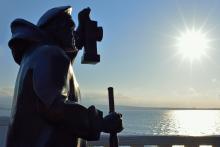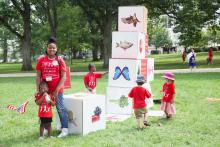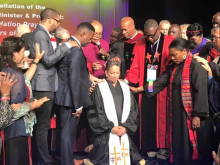Opinion

We live in a world full of extremists. It is not just in American society that the battle between extreme beliefs on either end of the spectrum is happening constantly in our political, social, and religious circles. Violence, hate crimes, and acts of oppression erupt all over the world, and through the news and social media, we are witnesses to the distress calls of the people who are caught in the middle of these battles

Gay is a true prophetic voice. She laments her life, her trauma, and her weight. She doesn’t promise victory but speaks to the pain that so many people feel: victims and survivors of sexual violence, bisexual people, fat people, and lonely people.

What we’ve learned three years after Eric Garner’s death is that we can’t give up on God’s mandate for justice, incarnated in the gospel’s good news. If we trust and believe that selfish agendas of special interests will not prevail, we are compelled instead to believe that love will conquer hate.

As Wendell Berry reminds us, “There are no unsacred places; there are only sacred places and desecrated places.” The earth is the Lord’s and everything in it. Jacob’s story reminds us that it is not God who changes, suddenly appearing when previously absent, but it is Jacob who wakes up to a new awareness of where God is.

Help them understand they have a voice.
Elizabeth Brandt, a mom and a participant of the play-in, takes her young daughters to her senators’ office. She believes she believes this will lay a foundation for her daughter to speak up throughout her life.
“She may not have the most articulate things to say — last year when she was three she asked them not to throw trash in the ocean which our senators don’t do — but she’s learning that she has a voice in this process and that’s about the most important thing,” said Brandt.

A Christianity that would vote for its own defense over the defense of those coming from war-torn countries, or the most in need among us, does not abide by the commands of its true champion — Jesus Christ.

This week Rev. Teresa Hord Owens was elected General Minister and President of the Christian Church (Disciples of Christ), becoming the first African-American woman installed as head of a denomination (although there have been moderators like Belva Brown Jordan, leading pastors, and bishops of other denominations over the decades).
Much can and should be made of the firsts represented by her election.

We will need both lament and hope to cope with the existential crisis of climate change. Go read New York Magazine writer David Wallace-Well’s piece for your dose of lament. Then read the stories below for a briefing on where to look for hope.

But really, the best performance in the film belongs to Nanjiani —no surprise, since it’s partly his own story. The affection he feels for his parents makes him afraid to upset them, but to really come into his own as a person, and as a comedian, he has to be honest with them about what he wants for his life.

As Congress returns and as leaders of the Senate and House continue their desperate search for ways to pass their health and budget proposals, I have one simple question for those whose votes will decide these matters: Is this really why you came to Washington, to take health care from the sick and food from the hungry?

America as a largely Christian nation is under scrutiny for its values and integrity. It’s an interesting time to be a person committed to faith in action. How does Christian faith inspire a response to these chaotic times?

It is a scary thing to let the ones who have been at the bottom rise to the top.
It’s scary when privilege begins to lose.
It’s scary when those that have been “other” for so long get a place at the table.
It’s scary when things get uncomfortable and messy.
But then, that’s Kingdom.

If we have learned anything from the past several decades, healing from a 500-year heritage of slavery will take more than a generation or two. I am humbled when I think of this because I realize that the relentless, demonic agony inflicted for 500 years will not be undone or healed by a single generation. My body will have flitted through the breeze as dust many times over once this 500-year heritage has been unwound and restitched. Healing takes more than just time.

In the midst of a raging discussion about what it means to be American, it is worthwhile to reflect on the profound ambivalence of American civil religion — perhaps the most powerful force for creating a shared national identity.
In 1967, Robert N. Bellah’s seminal essay, “Civil Religion in America,” created a template for how both the right and the left defined civil religion to cultivate a sense of belonging, particularly in an era of turbulence. During this period of increasing polarization, Bellah’s words are more relevant than ever.

The focus of [Jas Singh]'s farm is not production, but invitation — to allow all manner of flesh-and-blood to participate in the mysterious and divine but simple work of God’s kingdom — one where everyone who is fed, and those who typically don’t have the means to provide actually find they have an abundant harvest to share with their neighbor. It is a way to radically engage in leveling the field for all to give, receive, and partake in a way that doesn’t match our unjust economic structures.

Liberty and freedom aren’t fancy words or individual guarantees. They’re a process that requires everyone’s participation. We can’t have liberty and justice for all until we’re willing to see the injustice and the lack of liberty all around us, and commit ourselves to doing something about it.

The United States is exhibiting all the symptoms of a nation in a death spiral. We see the evidence everywhere, but the crisis extends beyond the U.S. I don’t agree with Donald Trump very often, but he’s right about one thing. At the beginning of his European trip, he said in Poland, “The fundamental question of our time is whether the West has the will to survive."

Olcese: In the creation of the film, did you find yourself sympathizing with one character or the other? Was one character easier to make more sympathetic?
Hamm: No. I couldn’t. I absolutely wanted to make the film balanced and fair to both sides. That was completely essential. Don’t forget, both these figures were not liked in Europe before they became statesmen. They were both radical. McGuinness was an ex-member of the IRA, Paisley was a firebrand preacher on the right. These were two men who were pretty much despised universally outside of their own base. It’s like The Odd Couple in the back of a car. I think what the humanity of that is when you take all that away, when you remove from the politician the artifice, and you get a chance to look at them as people, and I think that’s what happens in the movie.

Unfortunately, the script, by writer Colin Bateman often tends toward the bland, with the exception of a couple of pivotal scenes. Both Paisley and McGuinness were big, powerful personalities, with many facets to explore. The script, however, takes what could be a truly interesting exploration of two dynamic characters, and often reduces them to a pair of old men arguing in the back of a car. There are some standout moments where beliefs are challenged and moments of real emotional honesty are reached, but it takes some waiting to get there.

For the brilliant theologians who teach and research at seminaries or divinity schools, part of their work is training the next generation of future pastors for church leadership. Catholic and many Protestant church leaders have received a thorough theological education (though not all). They possess Masters and Doctoral degrees that solidify their ability to grasp the tenets of theology. But for those theologians interested in changing the world for the better, they must offer work that is easily understood by the masses, especially the marginalized population they are seeking to assist.